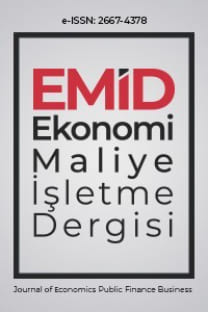KALKINMA İKTİSADINA FARKLI BİR BAKIŞ AÇISI: DAVRANIŞSAL KALKINMA İKTİSADI
Kalkınma İktisadı, Davranışsal İktisat, Davranışsal Kalkınma İktisadı
___
- Banerjee, A., & Duflo, E. (2011). Poor economics: A radical rethinking of the way to fight global poverty. Public Affairs.
- Berndt, C. (2016). Behavioral economics and development policy. Erişim linki: https://www.researchgate.net/profile/Christian_Berndt/publication/334989272_Behavioral_economics_and_development_policy/links/5d4953c7299bf1995b6983ee/Behavioral-economics-and-development-policy.pdf
- Bertrand, M., Mullainathan, S., & Shafir, E. (2004). A behavioral-economics view of poverty. American Economic Review, 94(2), 419-423.
- Datta, S., & Mullainathan, S. (2014). Behavioral design: a new approach to development policy. Review of Income and Wealth, 60(1), 7-35.
- Demeritt, A., & Hoff, K. (2016). “Small Miracles”—Behavioral Insights to Improve Development Policy: The World Development Report 2015. In Contemporary Issues in Development Economics (pp. 19-43). Palgrave Macmillan, London.
- Demeritt, A., & Hoff, K. (2018). The making of behavioral development economics. The World Bank.
- Galiani, S., & McEwan, P. J. (2013). The heterogeneous impact of conditional cash transfers. Journal of Public Economics, 103, 85-96.
- Kahneman, D. (2011). Thinking, fast and slow. Macmillan.
- Karlan, D., McConnell, M., Mullainathan, S., & Zinman, J. (2016). Getting to the top of mind: How reminders increase saving. Management Science, 62(12), 3393-3411.
- Kremer, M., Rao, G., & Schilbach, F. (2019). Behavioral development economics. In Handbook of Behavioral Economics: Applications and Foundations 1 (Vol. 2, pp. 345-458). North-Holland.
- Miguel, E., & Kremer, M. (2004). Worms: identifying impacts on education and health in the presence of treatment externalities. Econometrica, 72(1), 159-217. Mullainathan, S. (2007). Psychology and development economics. In Behavioral economics and its applications, 85-113.
- Mullainathan, S., & Thaler, R. (2001). Behavioral economics. International Encyclopedia of Social Sciences, 1.st edition, pp. 1094-1100. Pergamon.
- Muramatsu, R., & Avila, F. (2017). The behavioral turn in development economics: a tentative account through the lens of economic methodology. Brazilian Journal of Political Economy, 37(2), 363-380.
- Schultz, T. W. (1979), Theodore W. Schultz - Prize Lecture: The Economics of Being Poor. Stockholm: The Royal Swedish Academy of Science.
- Sen, Amartya. (1989). Development as Capability Expansion, Journal of Development Planning, 19, 41-58.
- Simon, H. A. (1972). Theories of bounded rationality. Decision and organization, 1(1), 161-176.
- Song, C. (2020). Financial Illiteracy and Pension Contributions: A Field Experiment on Compound Interest in China. The Review of Financial Studies, 33(2), 916-949.
- Thaler, R. H., & Sunstein, C. R. (2008). Nudge: Improving decisions about health, wealth, and happiness. Penguin.
- The Royal Swedish Academy of Science (14 October 2019). Understanding Development and Poverty Alleviation. Scientific Background on the Sveriges Riksbank Prize in Economic Sciences in Memory of Alfred Nobel 2019.
- Todaro, M. P. & Smith, S. C. (2015). Economic Development. Twelve edition. United States od America: Pearson.
- Vermeersch, C. & Kremer, M. (2005) ‘School Meals, Educational Achievement, and School Competition: Evidence from a Randomized Evaluation’, World Bank Policy Research Working Paper No. 3523.
- World Bank Group (2015), World Development Report 2015: Mind, Society, and Behaviour. Washington, DC: World Bank.
- Yayın Aralığı: Yılda 2 Sayı
- Başlangıç: 2018
- Yayıncı: Adil AKINCI
COVID-19 PANDEMİSİ VE GELECEĞİN PARA BİRİMİ OLARAK MERKEZ BANKASI DİJİTAL PARA BİRİMİ
COVID-19 EKONOMİK ETKİLERİ VE TEDBİRLER: TÜRKİYE’DE “HELİKOPTER PARA” UYGULAMASI
ROBONOMİ VE MÜŞTERİ MEMNUNİYETİ: HİZMET ROBOTLARINA İLİŞKİN LİTERATÜR TARAMASI
Hüseyin ÇETİN, Mehmet Nuri SALUR, Ahmet AKUSTA
MUHASEBE VE VERGİ UYGULAMALARINDA E-DÖNÜŞÜM: 509 NOLU V.U.K. GENEL TEBLİĞİNİN TİCARİ HAYATA ETKİLERİ
KALKINMA İKTİSADINA FARKLI BİR BAKIŞ AÇISI: DAVRANIŞSAL KALKINMA İKTİSADI
DIŞ TİCARETİN REEL DÖVİZ KURUNA ETKİSİ: TÜRKİYE ÜZERİNE UZUN DÖNEMLİ BİR NEDENSELLİK ANALİZİ
ESPING-ANDERSEN VE REFAH REJİMİ TARTIŞMALARI: TEORİK BİR DEĞERLENDİRME
KORONAVİRÜSÜN (COVID-19 )FİNANSAL GÖSTERGELER ÜZERİNE ETKİLERİ
Samet GÜRSOY, Mert Baran TUNÇEL, Burak SAYAR
FREE MARKET ECONOMY AND THE EFFECT OF MACROECONOMIC FACTORS ON GROWTH: THE CASE OF SOUTH KOREA
